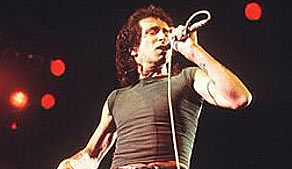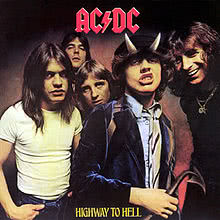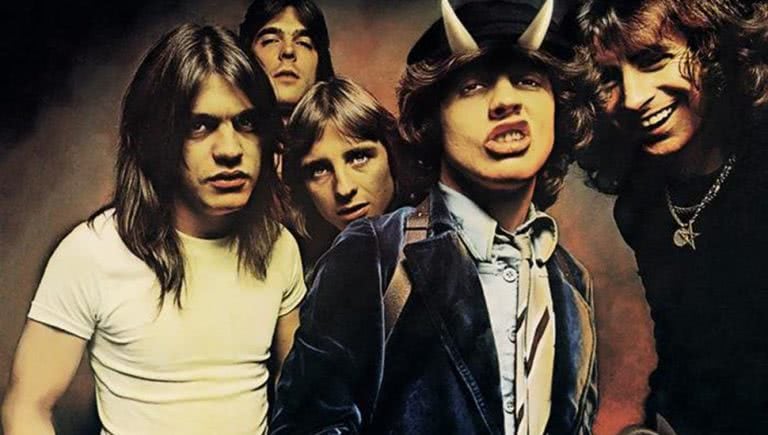As AC/DC celebrate the 40th anniversary of the Highway To Hell album, it’s hard to believe that their second highest selling record (after Back In Black) was their most turbulent to make.
Trouble began even before recording kicked off on their sixth album (their fifth to be recorded internationally) and continued long after its release.
AC/DC were broke and starving in 1978. Singer Bon Scott’s excessive drinking was becoming a problem.
Hell’s Bells Bedlam
Angus Young would recall to Guitar World in 1993: “Just because you call an album Highway To Hell you get all kinds of grief.
“And all we’d done is describe what it’s like to be on the road for four years, like we’d been.
“A lot of it was bus and car touring, with no real break.
“You crawl off the bus at four o’clock in the morning, and some journalist’s doing a story and he says, ‘What would you call an AC/DC tour?’
Love Music?
Get your daily dose of metal, rock, indie, pop, and everything else in between.
“Well, it was a highway to hell. It really was.
“When you’re sleeping with the singer’s socks two inches from your nose, that’s pretty close to hell.”
Make You Wanna Cry
There were more serious problems. AC/DC had cracked Australia, Europe and the UK but the massive American market remained elusive.
They got no airplay there, and their US record company Atlantic turned down releasing the 1976 LP Dirty Deeds Done Dirt Cheap.
Their live album, If You Want Blood You’ve Got It, which was supposed to do a Kiss and explode its record sales by capturing its live excitement. But it stiffed.
In January 1979, Atlantic’s powers-that-be summoned AC/DC manager Michael Browning from sunny Sydney to snow-bound New York for “a discussion”.
One idea was that Bon’s voice was not right for American radio and he should go. Browning refused, knowing that Malcolm and Angus Young would never agree.

Baby Please Don’t Go
The other contention was that Harry Vanda and George Young, who had mentored and produced AC/DC’s early albums in Sydney, had to go.
Atlantic wanted an international producer who could give them a radio-friendly sound.
Malcolm and Angus were enraged at what they considered a betrayal, especially to their brother.
Family ties were paramount with the Youngs; they never forgave Browning, and he would later be replaced.
The two were already toting a massive chip on their shoulders when they started work in Miami with Atlantic’s first choice Eddie Kramer, who had engineered for the likes of Jimi Hendrix, Led Zeppelin and Kiss.
It didn’t help maters when Kramer pointed to Scott and said, “Can your guy sing?”
Kramer’s later recollection of the sessions was “(I) realised that there was an obvious difficulty with the singer too.
“He had the most incredible voice, but trying to keep him in check from his drinking was a very tough call.
“But I think more than anything, the band resented me being foisted onto them. It was like sticking a pin into them.”
After three weeks, Malcolm rang Browning, tersely telling him, “This guy’s hopeless.”
He complained” Kramer wanted them to do a cover of the Spencer Davis Group’s ‘60s hit ‘Gimme Some Loving’.
Both Browning and Young confirmed this story. But when Sydney writer Murray Engleheart was researching his book Maximum Rock’n’Roll and put it to Kramer, the producer replied, “I don’t remember making that suggestion. But if I did, what a dumb thing to say.”
Guy’s Got Rhythm
Browning pitched for Robert “Mutt” Lange who had worked with British acts as the Boomtown Rats and City Boy.
Lange’s manager turned him down, saying AC/DC weren’t big enough.
But Browning persevered. When he told Malcolm they got Lange, the guitarist’s reply was, “Who’s he?”
AC/DC told Kramer they were taking a day off and not to bother coming into the studio.
They then sneaked in and cut six songs, and sent them to Lange for consideration.
The 31 year old from Zambia, Africa, was totally opposite to the Sydneysiders. He was a strict vegetarian and partial to country music.
But when work began at Roundhouse Studios in London, they ran more or less smoothly.
Lange had a strong work ethic, refining their sound with a minimalistic sound.
The album took three months to make, running 15 hours a day, a fair cry from the three weeks their earlier albums had taken.
Malcolm related to Mojo, “He made sure the tracks were solid, and he could hear if a snare just went off.”

Hard As A Rock
Lange brought Phil Rudd’s bass drum up in the mix, working off Malcolm’s steady rhythm drive, creating the energy of ‘Girl’s Got Rhythm’, ‘Shot Down In Flames’, ‘Touch Too Much’ and ‘If You Want Blood (You’ve Got It)’.
A good musician who’d played in a band in South Africa, he got Angus to sit next to him while he showed him how to structure the guitar solo of the title track.
Naturally Angus was initially not impressed at this but Lange’s approach worked.
The riff had begun in Miami (“and we were flat broke”) when Angus said to his brother, “I think I got something here” and Malcolm slid behind the drum kit and worked out the beat.
Lange told Bon to breathe properly to get his vocals across.
One time when Bon was struggling with ‘If You Want Blood’ and Lange was making suggestions, Scott snapped back, “You’re so fucking good, ****, you do it!”
Lange, a trained singer, nailed it, even without bothering to stand, and Scott retreated.
Everyone knew that the song ‘Highway To Hell’ was going to storm US radio.
But Atlantic feared the title it would cause a backlash in the Bible Belt in the Deep South. The band refused to budge.
The label also wanted the album cover to feature a girl in angelic white walking alone. That too was confined to the dustbin, and they went for something more devilish.
Hell Ain’t A Bad Place to Be
At the end of the 6:18 ‘Night Prowler’, the final track of Highway To Hell, Scott signs off with the Robin Williams nonsensical farewell phrase on TV’s Mork & Mindy, ‘NA-NUU, NA-NUU! Shazbot!’
It was officially the last track Bon would sing.
The album as released on July 27, 1979. They went on tour, and his last concert was in Southampton, England on January 27, 1980.

In mid-February he made his last public appearance, as AC/DC played ’Touch Too Much’ on BBC-TV’s Top Of The Pops.
Scott would be found dead in a car on February 19 after a night of partying.
The mystery of his death remains to this day.
AC/DC have never performed live ‘Night Prowler’’, ‘Love Hungry Man’ (which Angus admits is the worst song AC/DC have ever written) and ‘Beating Around The Bush’.
For all the dramas, Highway To Hell eventually did the trick.
It went Top 20 in America and sold 7 million there. It became their first million seller in the UK, hit Europe and Canada like a tornado and spun 5 x platinum in Australia.
It would set them up for Back In Black which, with new singer Brian Johnson, became the third biggest selling album of all time with estimated sales of 50 million.

































